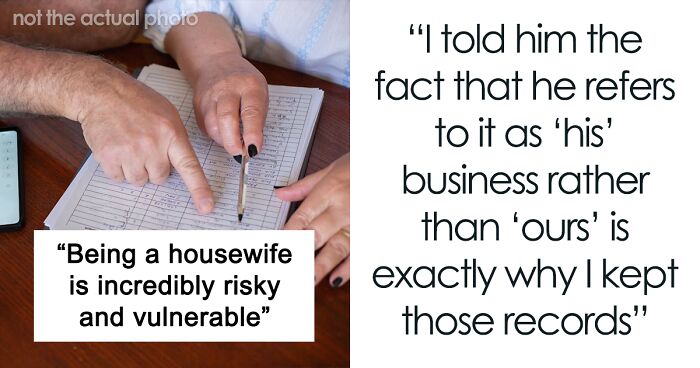
Man Asks Mom To Convince His Wife To Be A “Trad Wife”, She Reveals She Always Had An “Escape Plan”
One of the most important aspects of any romantic relationship is seeing your partner as an equal. But no matter how much love and respect there is, some people can still feel vulnerable if they become stay-at-home parents while their significant others focus on being the primary breadwinners.
One woman, redditor Huge_Association_249, asked the AITA community’s thoughts on whether she did anything wrong by keeping score of all the ways she’d contributed to the family business and its success, in case of divorce. Scroll down for the story in full, as well as how the internet reacted to the idea of keeping meticulous records to counteract the risk of being a housewife.
Bored Panda has reached out to the author for further comment, and we’ll update the article once we hear back from her.
Some women see becoming full-time housewives or stay-at-home parents as potentially risky proposals
Image credits: Mikhail Nilov / pexels (not the actual photo)
One internet user asked for people’s thoughts about her decision to keep a detailed record of all the ways she contributed to the family business
Image credits: Pixabay / pexels (not the actual photo)
Image credits: Huge_Association_249
There is a wide range of reasons why couples end up getting divorced, from a lack of support to financial stress
According to Forbes, 43% of divorced couples said that they broke up due to a lack of family support. Other top reasons for divorce include infidelity (34%), a lack of intimacy (31%), a lack of compatibility (31%), and too much conflict (also 31%).
Among the other factors that contributed to divorce, you’ll find financial stress (24%), a lack of commitment (23%), and parenting differences (20%).
Between 40% and 50% of married couples in the United States file for divorce, according to Divorce.com. Most of them are initiated by women (69%) rather than men (31%).
Statistically speaking, someone who has been married more than once has a higher likelihood of divorcing again. For example, second marriages have a 60% divorce rate in the US. Meanwhile, a whopping 73% of third marriages end up being dissolved.
In any relationship, there’s a need to balance trust with practicality. Trust is absolutely fundamental where love is concerned. However, this doesn’t mean that you have to give up your independence entirely.
Life can throw a lot of curveballs at you. Your significant other might get into an accident and if they lose their ability to provide for the family, that burden might fall on you. You and your partner might grow apart as the years and decades fly by. Or you might end up getting a divorce due to a number of possible reasons.
The labor market is highly competitive. Returning to it after a long break can be overwhelming
Image credits: energepic.com / pexels (not the actual photo)
In those cases, you don’t want to find yourself back in the labor market with rusty skills, barely any work experience, and overwhelming stress. Being competitive is hard even for someone who’s got an up-to-date resume with no gaps.
One way to sidestep this potential problem is if the stay-at-home parent focuses on some activities beyond childcare and chores. Parents aren’t just parents. People can find purpose in a variety of activities that go beyond parenting. And being saddled with the lion’s share of the housework can be frustrating if there isn’t enough support or recognition for all the effort from your partner.
You might want to consider continuing your education or getting an online diploma. Or you might get a part-time job, do volunteer work for a cause you believe in, or slowly build up a blog or business remotely, brick by brick. The specifics will depend on the individual, the family, and the relationship dynamics they have with their partner.
Having a contingency plan is practical. It doesn’t mean that you love or trust your partner less: it’s simply an admission of humility, namely, that none of us can predict the future.
Having a plan B, C, and D doesn’t necessarily mean that you trust someone less. They’re backup plans, and not the main plan, for a reason. They’re meant to give you some peace of mind, no matter what happens.
But what do you think, dear Pandas? Do you think that keeping score of one’s contributions is fair game in a relationship, in case of divorce? Or do you think that this fundamentally undermines trust? How would you mitigate any risk factors if you were a stay-at-home parent? Let us know what you think in the comments, we really want to hear your thoughts on this.
A few internet users had some relevant stories to share
Most readers were very supportive of the woman’s actions. Here are some of their thoughts
However, some people had more nuanced opinions. Here’s their take
Poll Question
Thanks! Check out the results:
Explore more of these tags
If they actually valued OP and cares about her they would've understood instead of getting defensive, literally proving OP was correct with how she handled things.
Good business sense, is just good business sense. Why are men folk so threatened?
It takes away from their feeling of control, being "the breadwinner", having someone reliant on them, "a man", etc.
Load More Replies...So hubby is mad that wife will never allow him the opportunity to screw her over *if he decides to*? Funny how that works. Why does he not acknowledge her contribution to *His Business*? Wow.
If they actually valued OP and cares about her they would've understood instead of getting defensive, literally proving OP was correct with how she handled things.
Good business sense, is just good business sense. Why are men folk so threatened?
It takes away from their feeling of control, being "the breadwinner", having someone reliant on them, "a man", etc.
Load More Replies...So hubby is mad that wife will never allow him the opportunity to screw her over *if he decides to*? Funny how that works. Why does he not acknowledge her contribution to *His Business*? Wow.

 Dark Mode
Dark Mode 

 No fees, cancel anytime
No fees, cancel anytime 








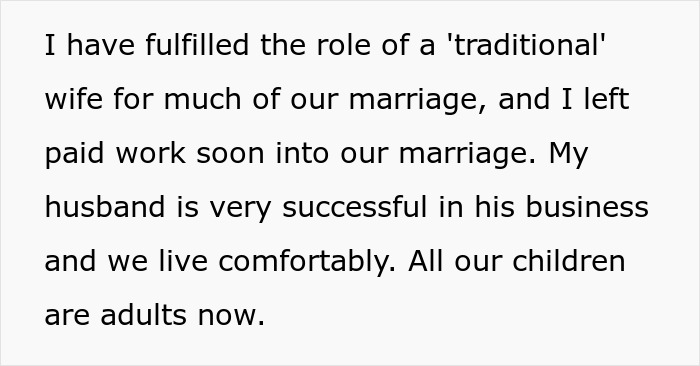
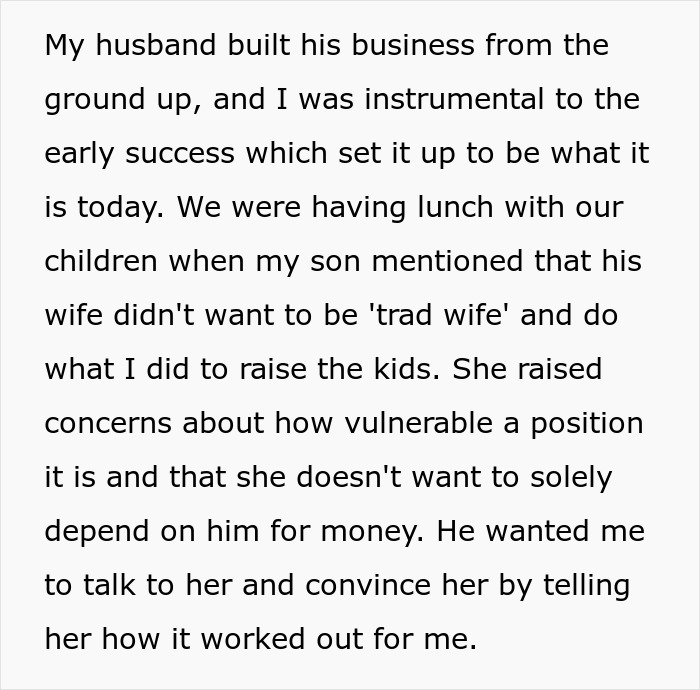
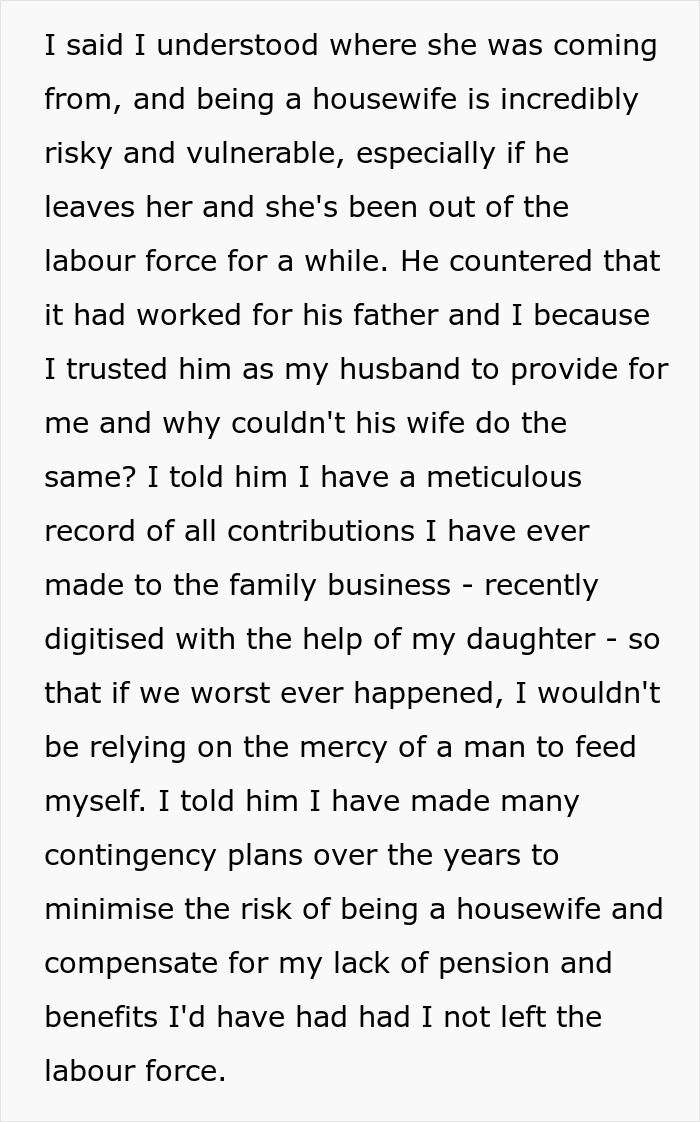





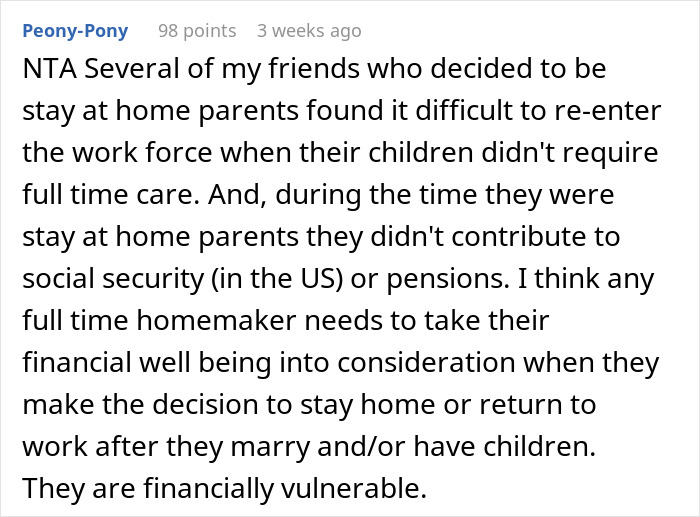

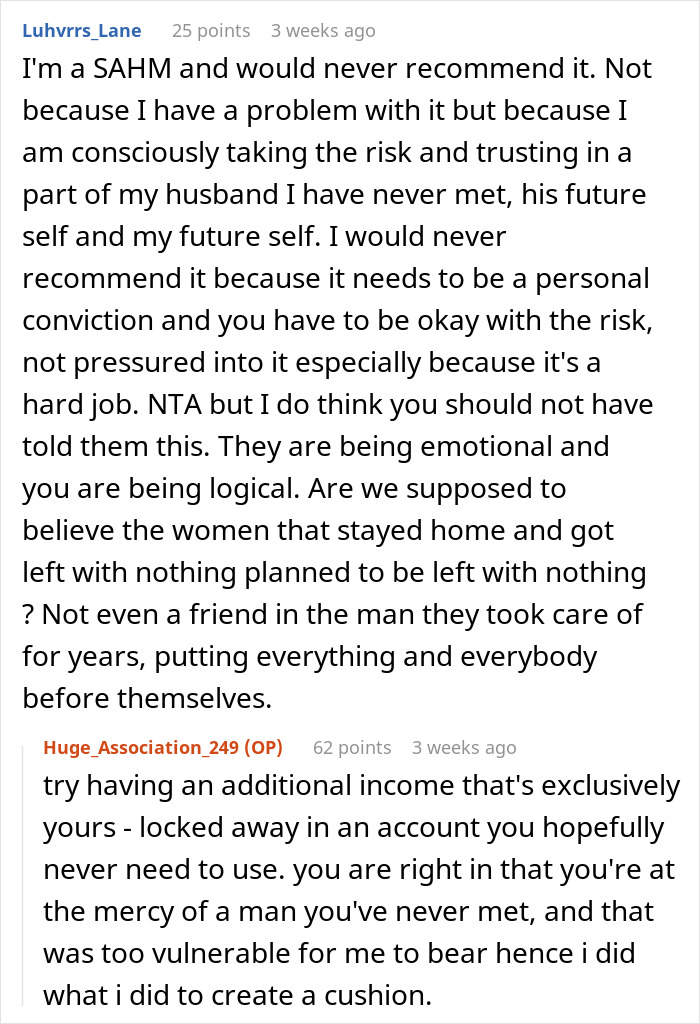


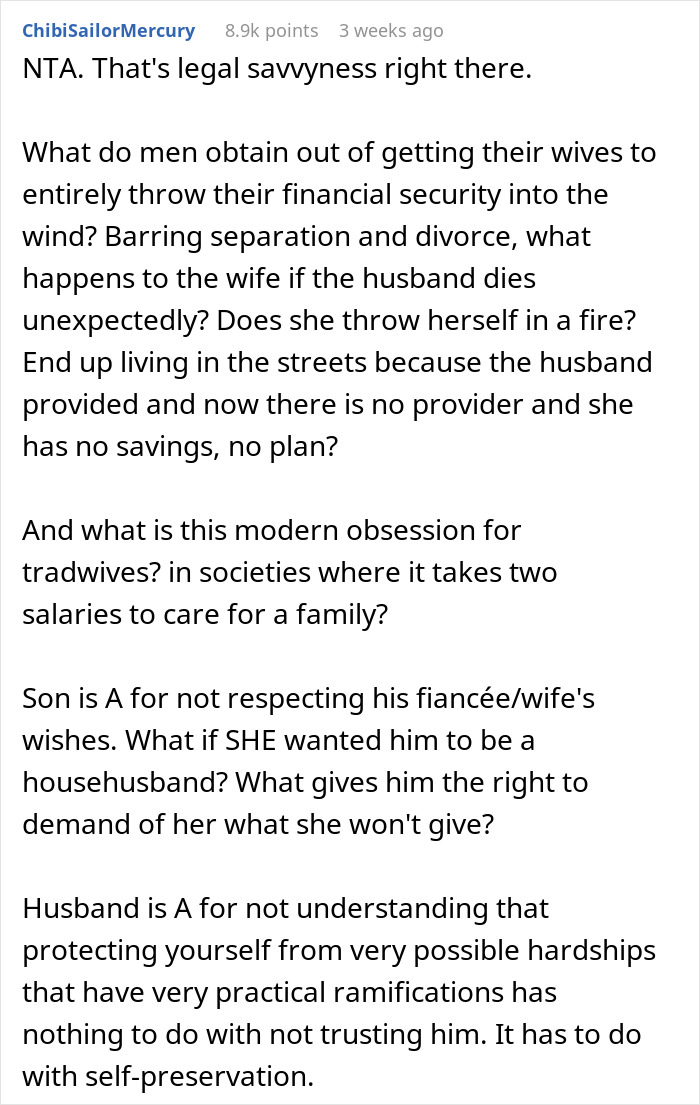
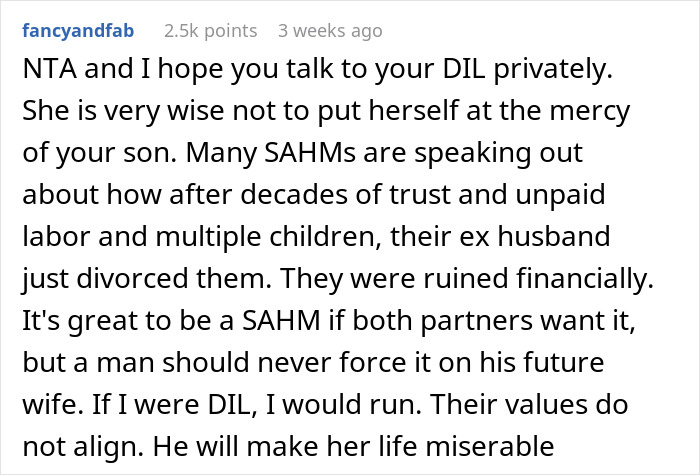







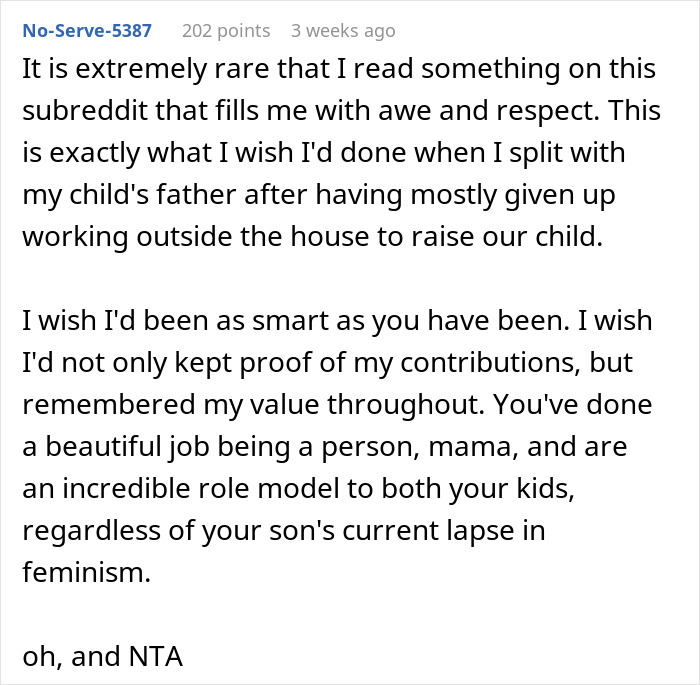
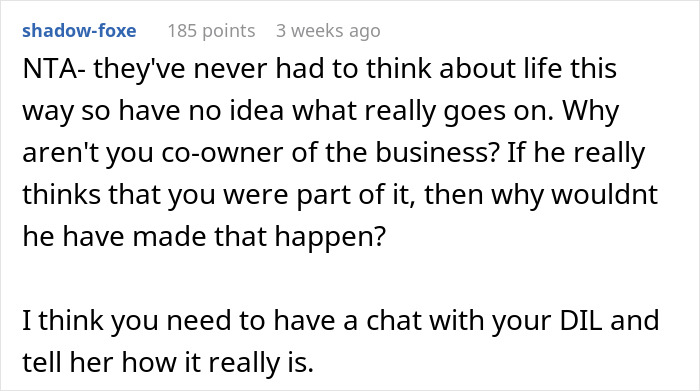

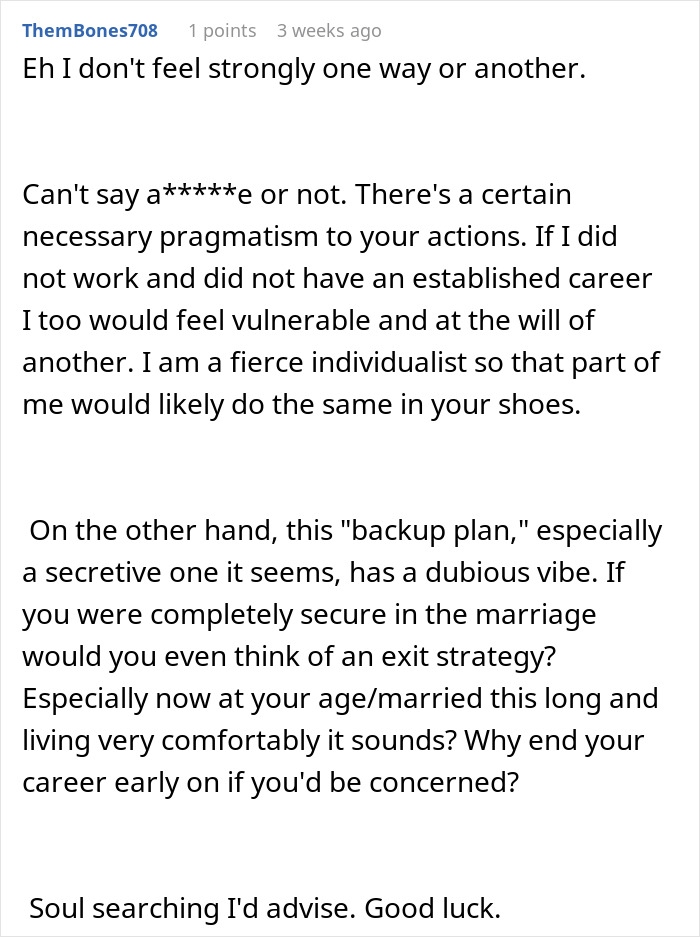












































41
32